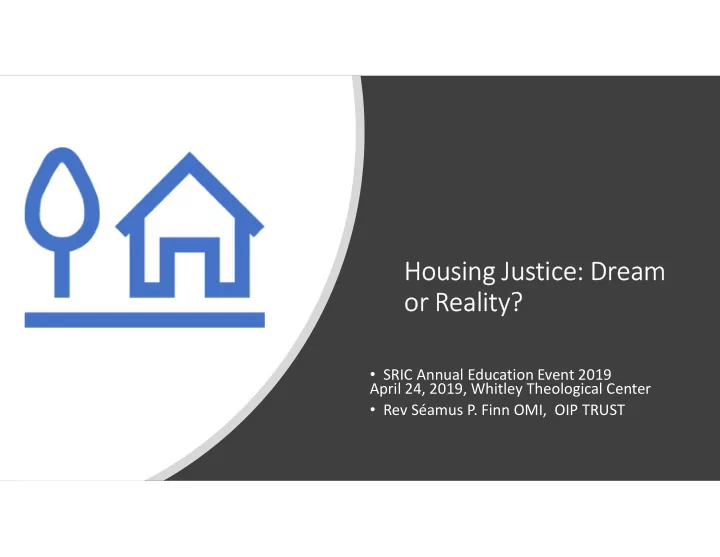

Housing Justice: Dream or Reality? • SRIC Annual Education Event 2019 April 24, 2019, Whitley Theological Center • Rev Séamus P. Finn OMI, OIP TRUST
Historical Intersection of the Moral and Legal • MORAL/FAITH • Scriptures and Tradition • Works of Charity and Almsgiving • Founders of Religious Congregation • REASON/LEGAL • Francisco de Vitoria OP (15 th Century) First great theorist of International law • Human Rights; Civil, Political, Social, Cultural and Economic • Housing/shelter as a human right specifically articulated • Church teaching re housing
UN Declaration of Human Rights 1948 • (1) Everyone has the right to a standard of living adequate for the health and well-being of himself and of his family, including food, clothing, housing and medical care and necessary social services, and the right to security in the event of unemployment, sickness, disability, widowhood, old age or other lack of livelihood in circumstances beyond his control.
• 11. But first We must speak of man's rights. Man has the right to live. He has the right to bodily integrity and to the means necessary for the proper development of Pacem in Terris life, particularly food, clothing, shelter, medical care, rest, and, finally, the 1963 (Pope necessary social services. In consequence, John XX111) he has the right to be looked after in the event of illhealth; disability stemming from his work; widowhood; old age; enforced unemployment; or whenever through no fault of his own he is deprived of the means of livelihood.
United States Catholic Conference 01 02 03 The Right to a Decent Home: Policy Statement: Economic Justice for All: A Pastoral Response to the Housing (Catholic Charities Pastoral Letter on Catholic Crisis in Housing (1975). USA). Housing: The Third Social Teaching and the U.S. Human Right (Washington, Economy 1986), # 61-95 D.C.: USCC Campaign for Human Development, 1985).
• The Church, "sharing the joy and hope, the grief and anguish of the people of our time, especially those who are poor or affected in any way,” feels it has a serious obligation to join with those Letter of Pope who are working, without self-interest and with dedication, to find concrete St John Paul II and urgent solutions to the housing problem and to see that the homeless receive the necessary attention and concern on the part of public authorities. (1) -- 1987
• Churches, community groups, the private sector, and state and local governments must all do more to meet our common responsibilities for Pontifical housing. We must recognize the homeless person as part of the Council for human family, as part of us. However, Justice & Peace there is no substitute for an involved, competent, and committed federal government providing resources, leadership, and direction for a broad and flexible attack on homelessness and poor housing.
• “Political authorities, religious leaders and, in general, public opinion all recognize that a situation in which millions of human beings lack adequate housing is a serious problem. . . . A fundamental human right is, in reality, being violated. An adequate response to such a large-scale problem PCJP 1988 calls for the shaping of a consistent political will, as well as increased awareness of the collective responsibilty of all, and particularly of Christians, for the future of society.” “What have you done to your homeless brother?”
• Lack of housing is a grave problem in many parts of the world, both in rural areas and in large cities, since state budgets usually cover only a small portion of the demand. Not only the poor, but many other members of society as well, find it difficult to own a home. Having a home has much to do with a sense of personal dignity and the growth of families. This is a major issue for human ecology. In some places, where makeshift shanty towns have sprung up, this will mean developing those neighborhoods rather than razing or displacing them. When the Laudato Sí Pope poor live in unsanitary slums or in dangerous tenements, “in cases where it is necessary to relocate them, in order not to Francis 2015 heap suffering upon suffering, adequate information needs to be given beforehand, with choices of decent housing offered, and the people directly involved must be part of the process”. At the same time, creativity should be shown in integrating rundown neighborhoods into a welcoming city: “How beautiful those cities which overcome paralyzing mistrust, integrate those who are different and make this very integration a new factor of development! How attractive are those cities which, even in their architectural design, are full of spaces which connect, relate and favor the recognition of others!” #152, 2015
Recommend
More recommend